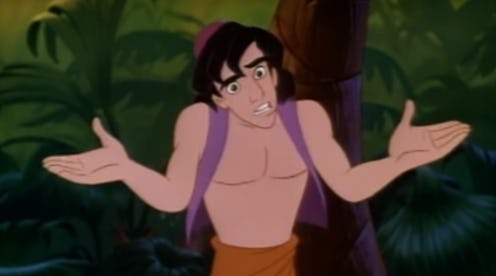Entertainment
Disney Admitted To Using Make-Up On White 'Aladdin' Performers To Help Them "Blend In"
In a bizarre turn of events, Disney has been accused of using brown-face on Aladdin performers. But the even more bizarre news? They don't deny it. The film was announced just last summer, and has been contentious ever since. Now, production is underway, and an explosive new claim has hit British media outlets. In the latest controversy, an extra from the Aladdin set alleges that the hair and makeup process for some of his "fair-skinned" costars has included skin darkening. Amazingly, Disney acknowledges that they have applied darker makeup to some actors and crew members, and allege that it was intended to help them "blend in."
The British Sunday Times spoke to the extra, a man named Kaushal Odedra who reportedly also does stand-in duties for one of the leads. In their Jan. 7 piece, the actor paints a disappointing picture of his experiences on-set. Although the film did reportedly cast hundreds of people of color as extras, Odedra claims to have witnessed multiple "very fair skinned" actors in line outside of a makeup tent, "waiting to have their skin darkened." He continued, "Disney are sending out a message that your skin colour, your identity, your life experiences amount to nothing that can be powered on and washed off."
And as troubling as the claims of what's been termed "browning up" are, Disney did not refute them in its statement, released to Deadline on Sunday. The studio defended the overall diversity of its casting, claiming that the application of makeup was a decision based on a need for both consistency and safety. (Bustle has reached out to Disney for further clarification on whether this alleged practice will continue going forward, but has not yet received a response.)
"Great care was taken to put together one of the largest most diverse casts ever seen on screen. Diversity of our cast and background performers was a requirement and only in a handful of instances when it was a matter of specialty skills, safety, and control (special effects rigs, stunt performers, and handling of animals) were crew made up to blend in."
Aside from the inclusion of a phrase as jarring as "blend in," this statement is all the more baffling because it indicates no acceptance of responsibility. There's no apology and no concern for the traumatic experience of an actor who claims to feel that his identity "amounts to nothing." Most confusing of all, there's no stated intention to change; Disney makes no pledge to discontinue their alleged use of brown-face going forward.
This is a particularly momentous claim because of all the controversy the film has already fielded, simply in its road to production. First, the studio came under fire for reported difficulties in finding a lead actor of Middle Eastern descent who was a strong enough singer and dancer to anchor the production. Unconfirmed reports that director Guy Ritchie was struggling to find such a performer led to concerns that the role would be whitewashed, although the casting of Canadian-born and ethnically Egyptian Mena Massoud soothed these worries. Months later, however, the studio again came under fire after they created a new character for the film, to be played by Billy Magnussen. Critics felt it was another attempt to whitewash the movie, and no one came out feeling good.
But while a Middle Eastern actor did get the role of Aladdin, the new role of the Caucasian Prince Anders has thus far remained in the script. So it remains to be seen whether Disney will bow to public pressure and change their ways. In the meantime, it continues to confuse critics that they've doubled down on their baffling choice instead of offering an apology.
